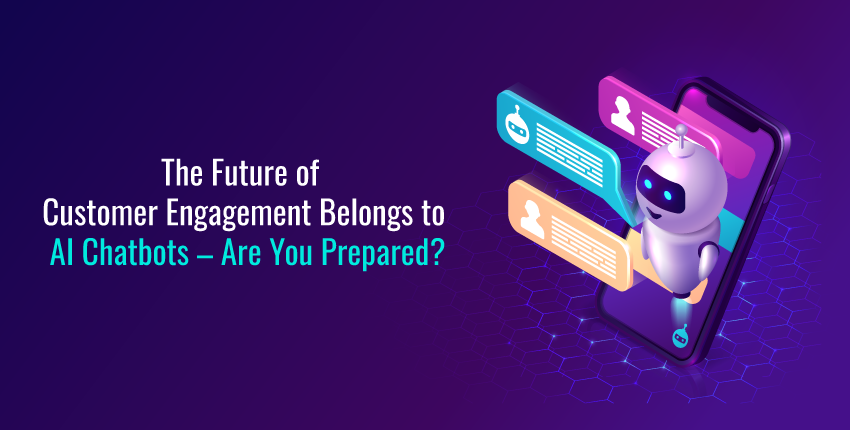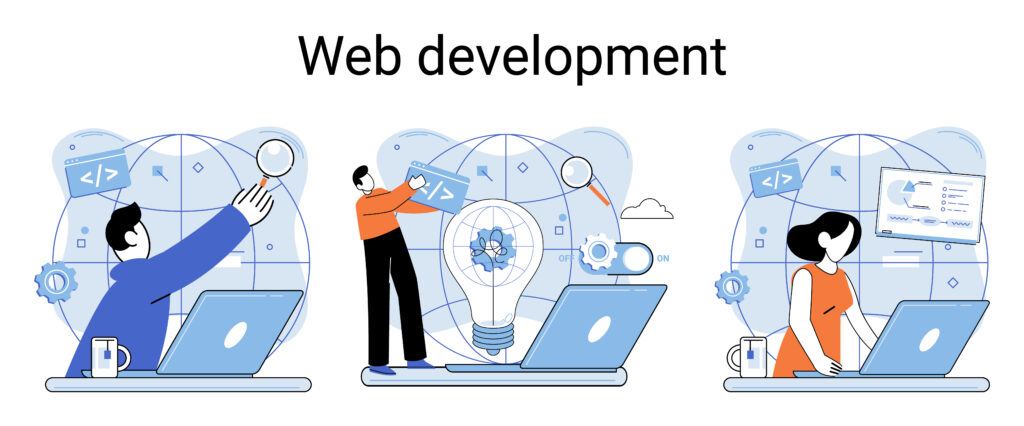Introduction:
In an ever-evolving digital landscape, businesses are constantly seeking innovative ways to enhance customer engagement and streamline customer service. One technology that has emerged as a game-changer in this arena is AI chatbots.
According to Gartner reports, by 2027, chatbots will be the primary channel for customer engagement in most organizations. There is a forecast that by 2025, the chatbot market size will reach around US$1.25 billion. By 2027, you can expect the revenue generated by the global chatbot market to reach US$454.8 million.
These conversational AI solutions are revolutionizing the way companies interact with their customers. In this blog post, we will delve into how AI chatbots can transform your customer service and engagement strategies, what sets them apart from normal chatbots, and real-world examples of their benefits.
How Can AI Chatbots Improve Customer Experience?
AI chatbots are designed to deliver an enhanced customer experience in several ways. Firstly, they can provide quick and accurate responses to customer inquiries, reducing response times and minimizing customer frustration. Secondly, they can handle a wide range of queries simultaneously, ensuring that no customer is left waiting. Additionally, they can personalize interactions based on customer data, making customers feel valued and understood.
How AI Chatbots Can Improve Your Customer Service and Engagement Game:
The benefits of AI chatbots in customer engagement are manifold. They can handle routine tasks such as answering frequently asked questions, processing orders, and providing product recommendations. This frees up human agents to focus on more complex and value-added tasks. Moreover, AI chatbots can be integrated into various communication channels, including websites, mobile apps, and messaging platforms, ensuring that customers can interact with your brand wherever they prefer.
Understanding AI Chatbots
Definition and Characteristics of AI Chatbots
AI chatbots are computer programs designed to simulate human conversation. They are powered by artificial intelligence and employ various technologies, including natural language processing (NLP), to understand and respond to customer queries.
How AI Chatbots Work
These digital assistants work by analyzing input text or voice and generating contextually relevant responses. They learn from each interaction, continually improving their performance.
Types of AI Chatbots
There are different types of AI chatbots, including rule-based chatbots that follow predefined rules, machine learning chatbots that learn from data, and NLP chatbots that understand and generate human-like language.
Benefits of Chatbots in Customer Engagement:
24/7 Availability:
Chatbots are always “on,” ready to assist customers at any time of day or night. This round-the-clock availability ensures that customers can get the help they need when it’s convenient for them, improving overall satisfaction.
Quick Response Times:
Chatbots can provide instant responses to customer queries, eliminating the frustration of waiting in long queues or for email responses. This speed enhances the customer experience and increases the likelihood of conversions.
Consistency:
Chatbots deliver consistent information and responses, ensuring that customers receive accurate and standardized information across all interactions. This consistency helps build trust in your brand.
Cost-Efficiency:
Implementing chatbots can significantly reduce customer service operational costs. They can handle a high volume of inquiries simultaneously, reducing the need for a large support staff and freeing up human agents for more complex tasks.
Scalability:
As your business grows, chatbots can easily scale to accommodate increased customer inquiries without the need for extensive hiring or training. This scalability ensures that customer engagement remains efficient and effective.
Personalization:
Advanced AI chatbots can analyze customer data and preferences to provide personalized recommendations and responses. This personal touch enhances the customer experience and increases the likelihood of repeat business.
Reduced Errors:
Chatbots are less prone to errors compared to human agents, as they follow predefined rules and algorithms. This reduces the risk of misinformation and ensures accuracy in responses.
Multichannel Support:
Chatbots can be integrated into various communication channels, including websites, mobile apps, social media, and messaging platforms. This versatility allows customers to engage with your brand through their preferred channels.
Data Collection and Analysis:
Chatbots can collect valuable customer data during interactions. This data can be used to gain insights into customer behavior, preferences, and pain points, helping you make data-driven decisions to improve products and services.
Improved Customer Satisfaction:
By offering quick, efficient, and personalized assistance, chatbots contribute to higher levels of customer satisfaction. Satisfied customers are more likely to become loyal customers and brand advocates.
Handling Routine Tasks:
Chatbots excel at handling repetitive and routine tasks, such as order processing, appointment scheduling, and FAQs. This allows human agents to focus on more complex and value-added interactions, further enhancing customer engagement.
Availability Across Time Zones:
For businesses with a global customer base, chatbots bridge the time zone gap, ensuring that customers from different regions receive timely support without delays.
The Future of Customer Engagement with AI Chatbots
Artificial intelligence (AI) chatbots have redefined the landscape of customer engagement. Their evolution from basic rule-based systems to advanced machine learning models and natural language processing (NLP) chatbots has paved the way for a revolution in how businesses interact with their customers. In this section, we delve into the exciting future that awaits customer engagement with AI chatbots.
Predictions and Trends
- Exponential Growth: Experts predict a meteoric rise in the adoption of AI chatbots across various industries. As businesses recognize the efficiency and cost-effectiveness of these digital assistants, their use will become ubiquitous.
- Advanced Capabilities: The future will see AI chatbots equipped with even more advanced capabilities. Enhanced NLP models will enable chatbots to engage in more natural and context-aware conversations, making interactions with customers virtually indistinguishable from human interactions.
- Multilingual Support: As businesses expand globally, AI chatbots will offer seamless multilingual support. This will cater to a broader customer base and enhance the user experience for diverse audiences.
- Emotional Intelligence: The integration of emotional intelligence into AI chatbots is on the horizon. Chatbots will be capable of recognizing and responding to customer emotions, thereby improving empathy and customer satisfaction.
- Cross-Channel Integration: AI chatbots will seamlessly integrate with various communication channels, such as social media, messaging apps, and voice assistants. This will provide customers with consistent, omnichannel experiences.
The Impact on Customer Service Jobs
- Augmentation, Not Replacement: While AI chatbots will play a pivotal role in customer service, they will not replace human agents. Instead, they will complement human efforts by handling routine queries, allowing human agents to focus on complex issues requiring empathy and creativity.
- Upskilling Opportunities: Businesses will invest in upskilling their customer service teams to work alongside AI chatbots. This will involve training agents to collaborate effectively with chatbots and handle hybrid interactions.
- Enhanced Job Satisfaction: Human agents will benefit from reduced repetitive tasks and more meaningful, emotionally intelligent interactions, leading to improved job satisfaction.
The Potential for AI Chatbots in Different Industries
- Healthcare: AI chatbots will offer virtual healthcare assistants, provide medical information, schedule appointments, and even monitor patient conditions remotely. This will enhance patient care and streamline healthcare operations.
- E-commerce: In the world of online shopping, AI chatbots will personalize product recommendations, assist with purchases, and provide instant customer support. This will lead to higher conversion rates and customer loyalty.
- Finance: AI chatbots will facilitate financial transactions, offer investment advice, and provide real-time updates on account balances. They will enhance financial institutions’ ability to serve their clients efficiently and securely.
- Travel and Hospitality: Chatbots will handle booking reservations, answer travel queries, and provide real-time updates on travel itineraries. This will simplify travel planning and enhance the overall travel experience.
Challenges and Considerations
Privacy and Data Security
Protecting customer data is paramount. Businesses must implement robust security measures.
Ensuring a Seamless Customer Experience
AI chatbots should seamlessly integrate with other customer touchpoints, ensuring a consistent experience.
The Role of Human Agents
Human agents still play a vital role, especially in complex situations that require empathy and human judgment.
Ethical Concerns and Bias in AI Chatbots
Developers must address biases in AI chatbots to ensure fair and unbiased interactions.
Preparing Your Business for AI Chatbots
Identify Your Objectives:
Before implementing AI chatbots, it’s crucial to define clear objectives. What specific tasks or challenges do you want chatbots to address? Whether it’s improving customer support, automating routine tasks, or enhancing user engagement, having a clear understanding of your goals will guide your chatbot strategy.
Understand Your Audience:
Effective chatbots are designed with your target audience in mind. Conduct thorough research to understand your customers’ preferences, behaviors, and pain points. Tailor your chatbot’s capabilities and personality to align with your audience’s needs and expectations.
Choose the Right Chatbot Type:
There are different types of chatbots, including rule-based and AI-powered chatbots. Assess your requirements and select the type that best fits your business needs. AI chatbots are highly versatile and adaptable, making them suitable for handling a wide range of tasks and interactions.
Select the Appropriate Technology:
Choosing the right technology stack and platform for your chatbot is essential. Consider factors like scalability, integration capabilities, and ease of development. It’s also vital to ensure data security and compliance with relevant regulations.
Data Management and Integration:
AI chatbots rely on data to provide personalized and context-aware responses. Ensure that your data is organized, clean, and accessible. Integrate your chatbot with existing systems, such as CRM software, to maximize its effectiveness.
Develop a Conversational Strategy:
Craft a conversational design strategy that outlines how your chatbot will interact with users. Pay attention to the tone, style, and language used to ensure a consistent brand voice and a positive user experience.
Conclusion
To conclude, the future of customer engagement undoubtedly lies in AI chatbots. These chatbots offer numerous benefits, but businesses must also navigate challenges and ethical considerations. Those who adopt this technology will not only enhance customer satisfaction but also position themselves for success in a world that is increasingly digital. Businesses must prepare for the AI chatbot revolution now, rather than later. Are you ready?












